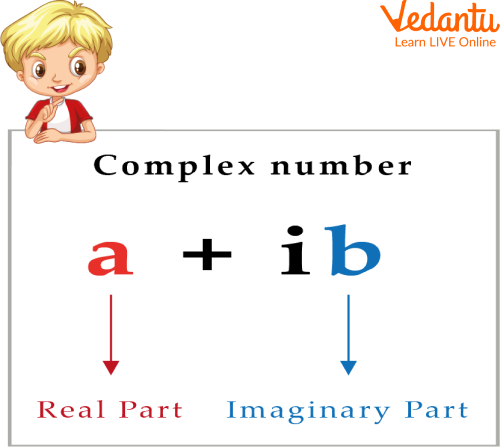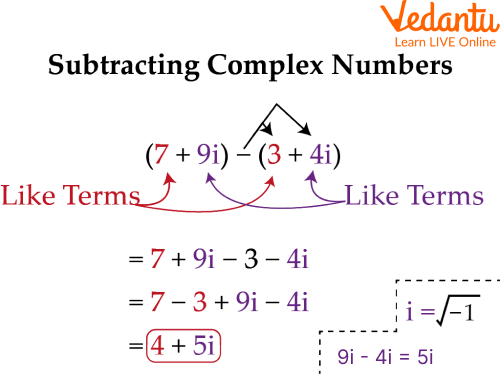




How to Subtract Complex Numbers: Rules, Steps & Solved Examples
In everyday life, addition and subtraction are the most used mathematical operations. We use it on a daily basis. If we go to the supermarket for shopping, we need an addition or subtraction of money to make the payment. We use addition or subtraction when we have some chocolates, and someone gives us more chocolates or if someone takes some chocolates from us.
Confused about complex numbers? Don't worry; all your doubts will be cleared after reading this article. Because in this article today, we are going to learn about what complex numbers are, what their properties are when it comes to subtraction, and what the steps are to solve complex numbers. So now, let's learn about the subtraction of complex numbers.
What are Complex Numbers?
Complex numbers are also numbers, but they are different from normal numbers in many ways. They are made with the help of two numbers that are combined.
And in the new combined number, the first number is the real number, and another one is the imaginary number. Like all complex numbers can be expressed in the form a + bi, here, a is the real number, and bi is the imaginary number.
Remember that Complex Numbers are denoted by the letter 'C'.
Complex numbers also use all mathematical operations: addition, subtraction, multiplication, and division. But today, we will learn about the subtraction of complex numbers, which is as easy as solving a normal number.
And the Subtraction of complex numbers requires a formula.
Do you know the formula for the subtraction of Complex Numbers?
So the formula is (a+ib) - (c + id) = (a-c) +i(b-d).

Complex Number
Properties of Subtracting Complex Numbers
Closure property - In the closure property of Subtracting Complex Numbers, the difference between complex numbers is also a complex number.
Commutative property- Subtraction of complex numbers is not commutative.
Associative property- Subtraction of complex numbers is not associative.
Remember that this general form of a complex number is different from the polar form. Similarly, the addition and subtraction of complex numbers in the polar form are different.
Steps to Subtract Complex Numbers
Subtraction of two complex numbers is easy if it's done in the right and systematic way. So let's see the steps of subtraction of complex numbers.
$\mathrm{z}_1=\mathrm{a}+\mathrm{ib}, \mathrm{z}_2=\mathrm{c}+\mathrm{id}$
Subtraction
$\mathrm{z}_1-\mathrm{z}_2+(a-c)-(c+i d)$
$\mathrm{z}_1-\mathrm{z}_2=(a-c)+(b-d) i$
where $a, b, c, d$ are real number and $i$ is imaginary number
Step 1: Disperse the negative
Step 2: Now combine the real and imaginary complex numbers in a single group.
Step 3: Now, you need to combine and simplify similar terms.
Step 4: The answer will be there.

Subtraction of two complex numbers example
Subtraction of Complex Numbers Examples
For the subtraction of two complex numbers, we need to Subtract the real number from the real and the imaginary numbers from the imaginary. Let's learn it through examples:
Q 1. Subtract $(4-3 i)$ from $(7+5 i)$
Ans. $=7+5 i-(4-3 i)$
$=7+5 i-4+3 i$
$=3+8 i$
Q 2. Subtract ( 8 - 15i ) from (15 - 34i )
Ans. $=15-34 i-(8-15 i)$
$=15-34 i-8+15 i$
$=7-19 i$
Q 3. Subtract $(2+2 i)$ from $(3+5 i)$
Ans. $=3+5 i-(2+2 i)$
$=1+3 i$
Points to remember for the Subtraction of Complex Numbers
Subtracting a complex number is like subtracting two binomials; we just need to combine the like terms.
The subtraction of two complex numbers does not hold in the commutative law.
All real numbers are complex numbers, but all complex numbers need not be real numbers.
Practice Questions
We know that maths is not learned just with reading. To understand it, we need to solve the question. So that's why we have provided a practice sheet for you. With the help of this practice sheet, you can better understand the subtraction of two complex numbers. Below are the addition and subtraction of complex numbers worksheets for your practice. Use the subtraction of complex numbers formula mentioned in this article to solve these problems.
Q1. $(16+5 i)+(8-3 i)$
Ans. $24+2 i$
Q2. $(5+7 i)-2 i$
Ans. $5+5 i$
Q3. $(4+3 i)-(4-3 i)$
Ans. 6i
Summary
In this article, we learned about the subtraction of complex numbers. With the help of this article, we learned what complex number is, how to subtract complex numbers, and what the properties of Subtracting Complex Numbers are.
We learn the steps we need to follow while subtracting a complex number. We also checked an example of subtraction of complex numbers, and at the end, there is a complex number worksheet with the help of which we can easily clear our concept of subtraction of complex numbers.
FAQs on Subtraction of Complex Numbers Explained
1. What is the basic rule for subtracting complex numbers?
To subtract two complex numbers, you subtract the real parts from each other and the imaginary parts from each other separately. If you have two complex numbers, z₁ = a + bi and z₂ = c + di, the formula is: z₁ - z₂ = (a - c) + (b - d)i. The result is always another complex number.
2. Can you provide an example of subtracting complex numbers?
Certainly. Let's subtract the complex number (4 + 2i) from (9 + 6i).
1. Identify the real and imaginary parts: Real parts are 9 and 4. Imaginary parts are 6 and 2.
2. Subtract the real parts: 9 - 4 = 5.
3. Subtract the coefficients of the imaginary parts: 6 - 2 = 4.
The final answer is 5 + 4i.
3. What does it mean for the set of complex numbers to be 'closed' under subtraction?
The closure property for subtraction means that when you subtract any two complex numbers, the result will always be another complex number. For instance, (a + bi) - (c + di) results in (a - c) + (b - d)i, which fits the standard form of a complex number. This property ensures that the operation of subtraction will never take you outside the set of complex numbers.
4. How is the additive inverse of a complex number used in subtraction?
The subtraction of a complex number is formally defined as the addition of its additive inverse. The additive inverse of a complex number z = (c + di) is -z = (-c - di). Therefore, the operation z₁ - z₂ is equivalent to performing the addition z₁ + (-z₂). This foundational concept shows how subtraction is fundamentally linked to addition in complex number algebra.
5. What is the geometrical interpretation of subtracting two complex numbers on an Argand plane?
Geometrically, subtracting a complex number z₂ from z₁ can be visualised using vectors. If z₁ and z₂ are represented as vectors from the origin, the difference z₁ - z₂ is the vector that starts at the tip of z₂ and ends at the tip of z₁. This new vector represents the distance and direction from the point z₂ to the point z₁ in the complex plane.
6. How is the subtraction of complex numbers different from the subtraction of 2D vectors?
The mechanical process is almost identical. For a complex number a + bi and a vector (a, b), the subtraction rules are parallel. You subtract the corresponding components. However, the key difference lies in the broader algebraic structure. Complex numbers support operations like multiplication and division in a way that vectors do not, leading to concepts like modulus, argument, and rotational effects.
7. Can you subtract a purely real number from a complex number?
Yes. A purely real number 'c' can be written as a complex number with a zero imaginary part, i.e., c + 0i. To subtract it from a complex number 'a + bi', you simply follow the standard rule: (a + bi) - (c + 0i) = (a - c) + (b - 0)i, which simplifies to (a - c) + bi. In effect, you only subtract from the real part.
8. Is there a simple formula for the modulus of the difference of two complex numbers, like there is for their product?
No, there is no simple formula for the modulus of a difference, like |z₁ * z₂| = |z₁| * |z₂|. The value of |z₁ - z₂| depends on both the individual moduli and the angle between the two complex numbers when represented as vectors. Its value is governed by the triangle inequality, which provides a range for the possible result rather than a single, direct formula.























